Principles of HSC: Healthcare Support and Ethical Dilemmas Report
VerifiedAdded on 2020/01/21
|14
|4479
|43
Report
AI Summary
This report delves into the core principles of Health and Social Care (HSC), emphasizing the importance of person-centered approaches and ethical considerations in healthcare settings. It examines how principles of support are applied to ensure effective care for individuals like Ahmed and Sylvia, addressing their rights, respecting diversity, and promoting independence. The report outlines procedures for protecting clients, patients, and colleagues from harm, analyzing the benefits of person-centered care. It explores ethical dilemmas and conflicts that may arise in providing care, support, and protection, such as those involving patient autonomy and conflicting opinions on treatment. Furthermore, the report discusses the implementation of policies, legislation, regulations, and codes of practice, as well as the impact of these on organizational policy and practice. It covers theories underpinning HSC practice, the influence of social processes, and the effectiveness of inter-professional working. The report concludes by reflecting on the author's role and contributions within HSC, offering recommendations for enhancing practice and meeting good practice requirements.

Principles of HSC
Paraphrase This Document
Need a fresh take? Get an instant paraphrase of this document with our AI Paraphraser
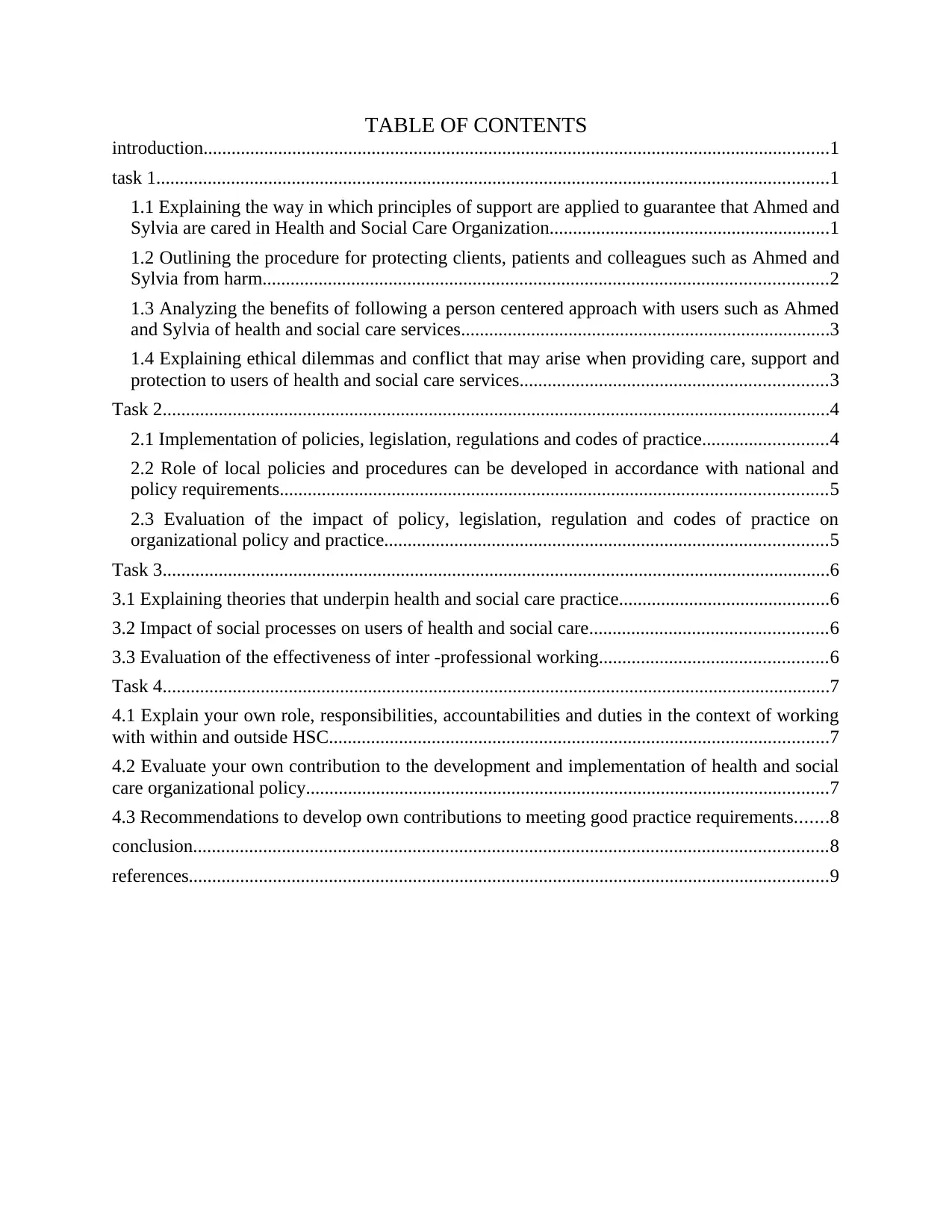
TABLE OF CONTENTS
introduction......................................................................................................................................1
task 1................................................................................................................................................1
1.1 Explaining the way in which principles of support are applied to guarantee that Ahmed and
Sylvia are cared in Health and Social Care Organization............................................................1
1.2 Outlining the procedure for protecting clients, patients and colleagues such as Ahmed and
Sylvia from harm.........................................................................................................................2
1.3 Analyzing the benefits of following a person centered approach with users such as Ahmed
and Sylvia of health and social care services...............................................................................3
1.4 Explaining ethical dilemmas and conflict that may arise when providing care, support and
protection to users of health and social care services..................................................................3
Task 2...............................................................................................................................................4
2.1 Implementation of policies, legislation, regulations and codes of practice...........................4
2.2 Role of local policies and procedures can be developed in accordance with national and
policy requirements.....................................................................................................................5
2.3 Evaluation of the impact of policy, legislation, regulation and codes of practice on
organizational policy and practice...............................................................................................5
Task 3...............................................................................................................................................6
3.1 Explaining theories that underpin health and social care practice.............................................6
3.2 Impact of social processes on users of health and social care...................................................6
3.3 Evaluation of the effectiveness of inter -professional working.................................................6
Task 4...............................................................................................................................................7
4.1 Explain your own role, responsibilities, accountabilities and duties in the context of working
with within and outside HSC...........................................................................................................7
4.2 Evaluate your own contribution to the development and implementation of health and social
care organizational policy................................................................................................................7
4.3 Recommendations to develop own contributions to meeting good practice requirements.......8
conclusion........................................................................................................................................8
references.........................................................................................................................................9
introduction......................................................................................................................................1
task 1................................................................................................................................................1
1.1 Explaining the way in which principles of support are applied to guarantee that Ahmed and
Sylvia are cared in Health and Social Care Organization............................................................1
1.2 Outlining the procedure for protecting clients, patients and colleagues such as Ahmed and
Sylvia from harm.........................................................................................................................2
1.3 Analyzing the benefits of following a person centered approach with users such as Ahmed
and Sylvia of health and social care services...............................................................................3
1.4 Explaining ethical dilemmas and conflict that may arise when providing care, support and
protection to users of health and social care services..................................................................3
Task 2...............................................................................................................................................4
2.1 Implementation of policies, legislation, regulations and codes of practice...........................4
2.2 Role of local policies and procedures can be developed in accordance with national and
policy requirements.....................................................................................................................5
2.3 Evaluation of the impact of policy, legislation, regulation and codes of practice on
organizational policy and practice...............................................................................................5
Task 3...............................................................................................................................................6
3.1 Explaining theories that underpin health and social care practice.............................................6
3.2 Impact of social processes on users of health and social care...................................................6
3.3 Evaluation of the effectiveness of inter -professional working.................................................6
Task 4...............................................................................................................................................7
4.1 Explain your own role, responsibilities, accountabilities and duties in the context of working
with within and outside HSC...........................................................................................................7
4.2 Evaluate your own contribution to the development and implementation of health and social
care organizational policy................................................................................................................7
4.3 Recommendations to develop own contributions to meeting good practice requirements.......8
conclusion........................................................................................................................................8
references.........................................................................................................................................9
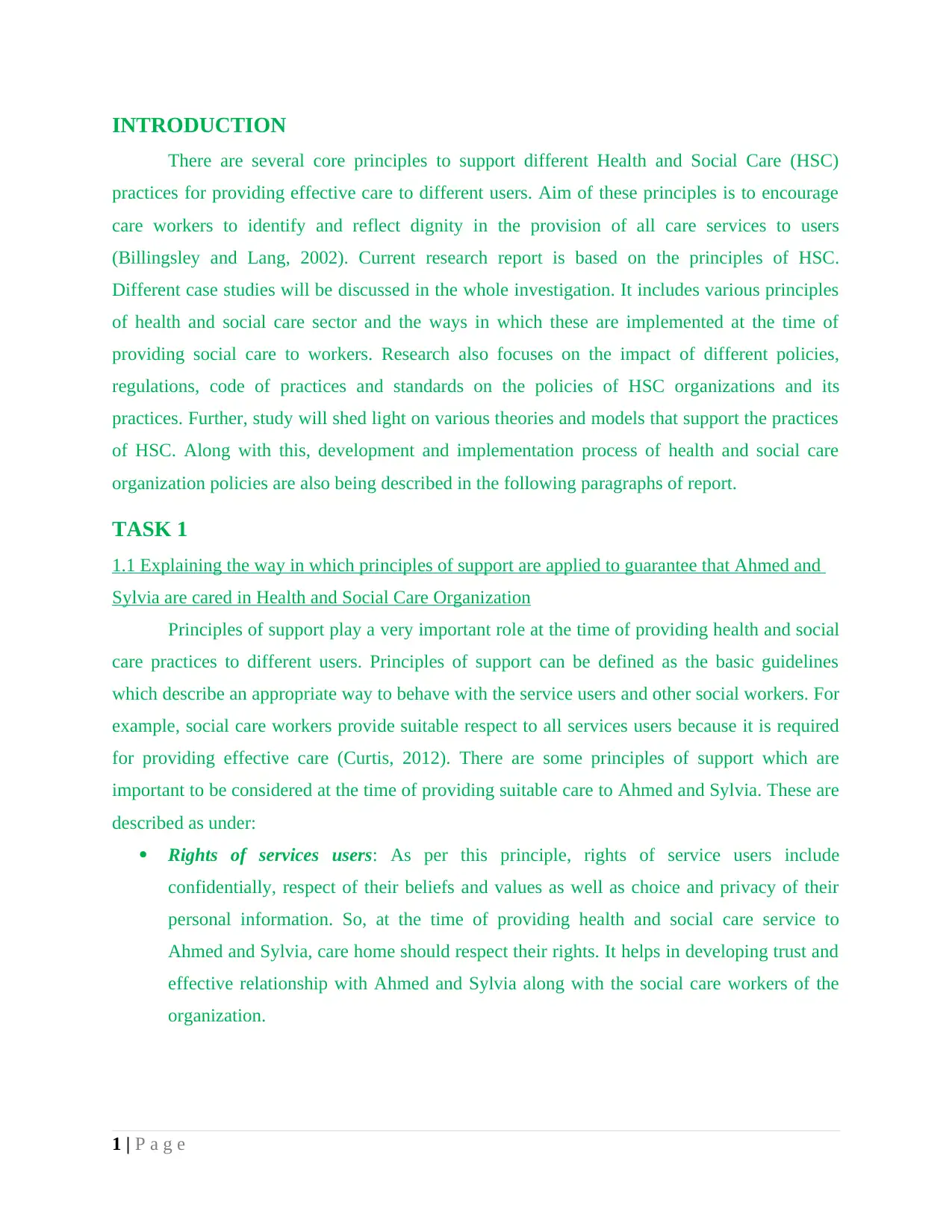
INTRODUCTION
There are several core principles to support different Health and Social Care (HSC)
practices for providing effective care to different users. Aim of these principles is to encourage
care workers to identify and reflect dignity in the provision of all care services to users
(Billingsley and Lang, 2002). Current research report is based on the principles of HSC.
Different case studies will be discussed in the whole investigation. It includes various principles
of health and social care sector and the ways in which these are implemented at the time of
providing social care to workers. Research also focuses on the impact of different policies,
regulations, code of practices and standards on the policies of HSC organizations and its
practices. Further, study will shed light on various theories and models that support the practices
of HSC. Along with this, development and implementation process of health and social care
organization policies are also being described in the following paragraphs of report.
TASK 1
1.1 Explaining the way in which principles of support are applied to guarantee that Ahmed and
Sylvia are cared in Health and Social Care Organization
Principles of support play a very important role at the time of providing health and social
care practices to different users. Principles of support can be defined as the basic guidelines
which describe an appropriate way to behave with the service users and other social workers. For
example, social care workers provide suitable respect to all services users because it is required
for providing effective care (Curtis, 2012). There are some principles of support which are
important to be considered at the time of providing suitable care to Ahmed and Sylvia. These are
described as under:
Rights of services users: As per this principle, rights of service users include
confidentially, respect of their beliefs and values as well as choice and privacy of their
personal information. So, at the time of providing health and social care service to
Ahmed and Sylvia, care home should respect their rights. It helps in developing trust and
effective relationship with Ahmed and Sylvia along with the social care workers of the
organization.
1 | P a g e
There are several core principles to support different Health and Social Care (HSC)
practices for providing effective care to different users. Aim of these principles is to encourage
care workers to identify and reflect dignity in the provision of all care services to users
(Billingsley and Lang, 2002). Current research report is based on the principles of HSC.
Different case studies will be discussed in the whole investigation. It includes various principles
of health and social care sector and the ways in which these are implemented at the time of
providing social care to workers. Research also focuses on the impact of different policies,
regulations, code of practices and standards on the policies of HSC organizations and its
practices. Further, study will shed light on various theories and models that support the practices
of HSC. Along with this, development and implementation process of health and social care
organization policies are also being described in the following paragraphs of report.
TASK 1
1.1 Explaining the way in which principles of support are applied to guarantee that Ahmed and
Sylvia are cared in Health and Social Care Organization
Principles of support play a very important role at the time of providing health and social
care practices to different users. Principles of support can be defined as the basic guidelines
which describe an appropriate way to behave with the service users and other social workers. For
example, social care workers provide suitable respect to all services users because it is required
for providing effective care (Curtis, 2012). There are some principles of support which are
important to be considered at the time of providing suitable care to Ahmed and Sylvia. These are
described as under:
Rights of services users: As per this principle, rights of service users include
confidentially, respect of their beliefs and values as well as choice and privacy of their
personal information. So, at the time of providing health and social care service to
Ahmed and Sylvia, care home should respect their rights. It helps in developing trust and
effective relationship with Ahmed and Sylvia along with the social care workers of the
organization.
1 | P a g e
⊘ This is a preview!⊘
Do you want full access?
Subscribe today to unlock all pages.

Trusted by 1+ million students worldwide
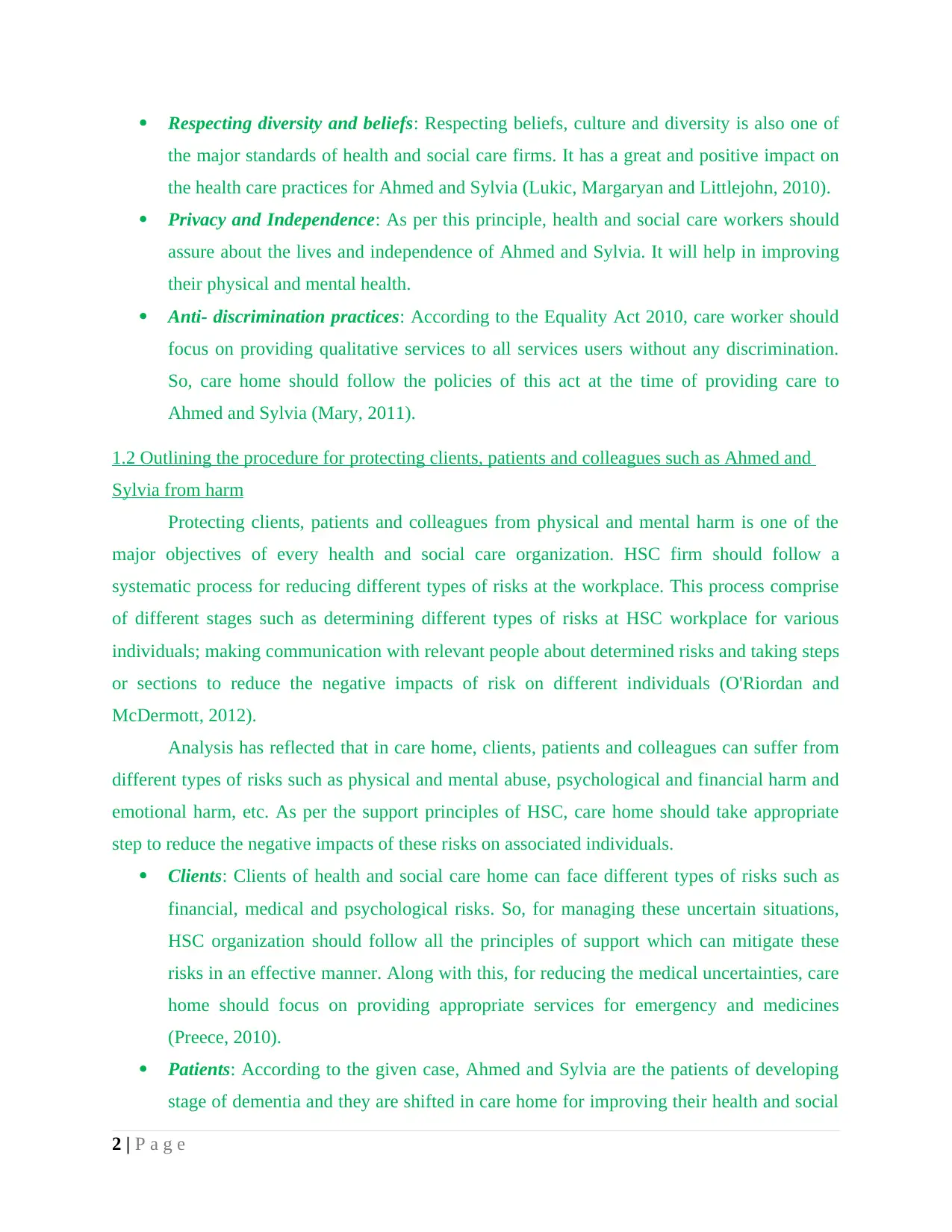
Respecting diversity and beliefs: Respecting beliefs, culture and diversity is also one of
the major standards of health and social care firms. It has a great and positive impact on
the health care practices for Ahmed and Sylvia (Lukic, Margaryan and Littlejohn, 2010).
Privacy and Independence: As per this principle, health and social care workers should
assure about the lives and independence of Ahmed and Sylvia. It will help in improving
their physical and mental health.
Anti- discrimination practices: According to the Equality Act 2010, care worker should
focus on providing qualitative services to all services users without any discrimination.
So, care home should follow the policies of this act at the time of providing care to
Ahmed and Sylvia (Mary, 2011).
1.2 Outlining the procedure for protecting clients, patients and colleagues such as Ahmed and
Sylvia from harm
Protecting clients, patients and colleagues from physical and mental harm is one of the
major objectives of every health and social care organization. HSC firm should follow a
systematic process for reducing different types of risks at the workplace. This process comprise
of different stages such as determining different types of risks at HSC workplace for various
individuals; making communication with relevant people about determined risks and taking steps
or sections to reduce the negative impacts of risk on different individuals (O'Riordan and
McDermott, 2012).
Analysis has reflected that in care home, clients, patients and colleagues can suffer from
different types of risks such as physical and mental abuse, psychological and financial harm and
emotional harm, etc. As per the support principles of HSC, care home should take appropriate
step to reduce the negative impacts of these risks on associated individuals.
Clients: Clients of health and social care home can face different types of risks such as
financial, medical and psychological risks. So, for managing these uncertain situations,
HSC organization should follow all the principles of support which can mitigate these
risks in an effective manner. Along with this, for reducing the medical uncertainties, care
home should focus on providing appropriate services for emergency and medicines
(Preece, 2010).
Patients: According to the given case, Ahmed and Sylvia are the patients of developing
stage of dementia and they are shifted in care home for improving their health and social
2 | P a g e
the major standards of health and social care firms. It has a great and positive impact on
the health care practices for Ahmed and Sylvia (Lukic, Margaryan and Littlejohn, 2010).
Privacy and Independence: As per this principle, health and social care workers should
assure about the lives and independence of Ahmed and Sylvia. It will help in improving
their physical and mental health.
Anti- discrimination practices: According to the Equality Act 2010, care worker should
focus on providing qualitative services to all services users without any discrimination.
So, care home should follow the policies of this act at the time of providing care to
Ahmed and Sylvia (Mary, 2011).
1.2 Outlining the procedure for protecting clients, patients and colleagues such as Ahmed and
Sylvia from harm
Protecting clients, patients and colleagues from physical and mental harm is one of the
major objectives of every health and social care organization. HSC firm should follow a
systematic process for reducing different types of risks at the workplace. This process comprise
of different stages such as determining different types of risks at HSC workplace for various
individuals; making communication with relevant people about determined risks and taking steps
or sections to reduce the negative impacts of risk on different individuals (O'Riordan and
McDermott, 2012).
Analysis has reflected that in care home, clients, patients and colleagues can suffer from
different types of risks such as physical and mental abuse, psychological and financial harm and
emotional harm, etc. As per the support principles of HSC, care home should take appropriate
step to reduce the negative impacts of these risks on associated individuals.
Clients: Clients of health and social care home can face different types of risks such as
financial, medical and psychological risks. So, for managing these uncertain situations,
HSC organization should follow all the principles of support which can mitigate these
risks in an effective manner. Along with this, for reducing the medical uncertainties, care
home should focus on providing appropriate services for emergency and medicines
(Preece, 2010).
Patients: According to the given case, Ahmed and Sylvia are the patients of developing
stage of dementia and they are shifted in care home for improving their health and social
2 | P a g e
Paraphrase This Document
Need a fresh take? Get an instant paraphrase of this document with our AI Paraphraser
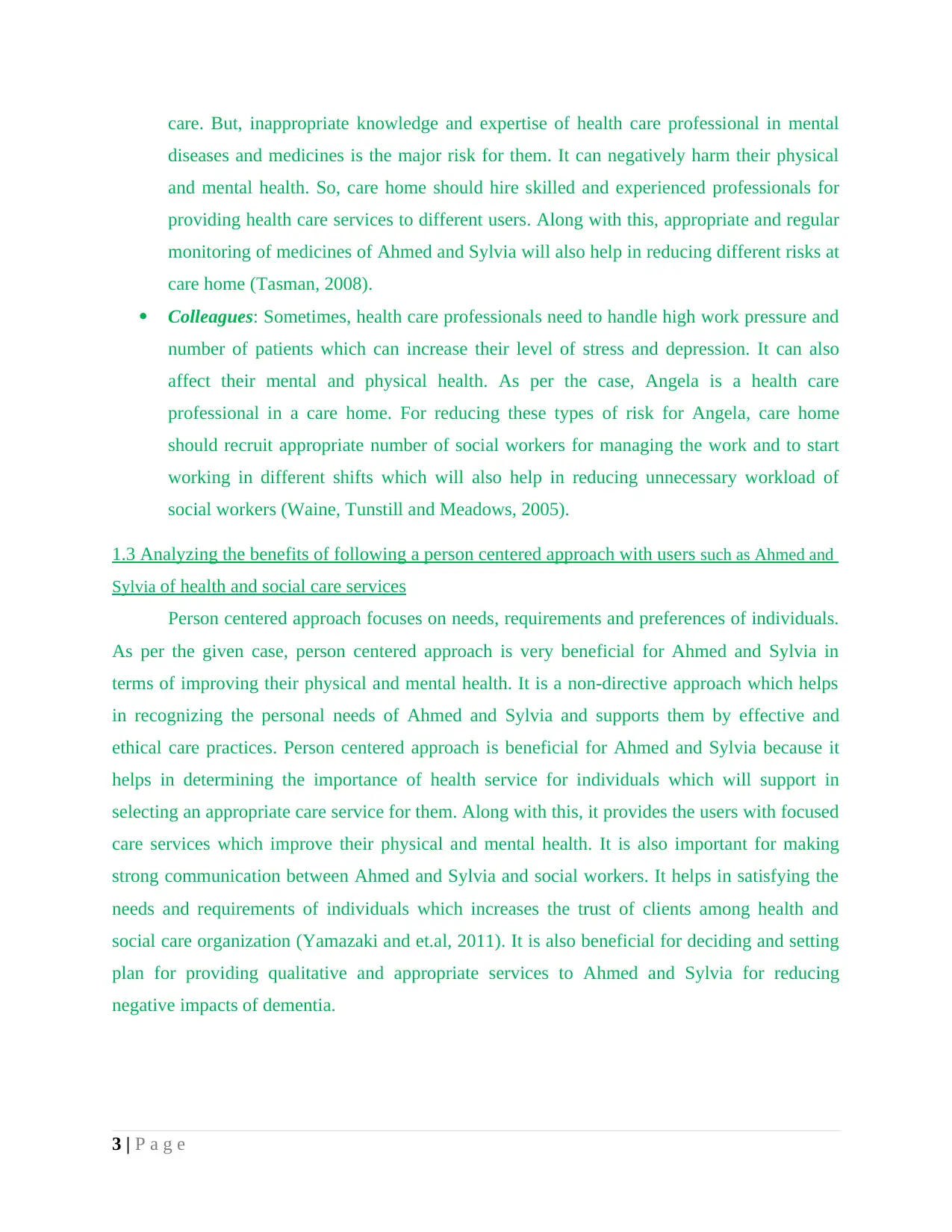
care. But, inappropriate knowledge and expertise of health care professional in mental
diseases and medicines is the major risk for them. It can negatively harm their physical
and mental health. So, care home should hire skilled and experienced professionals for
providing health care services to different users. Along with this, appropriate and regular
monitoring of medicines of Ahmed and Sylvia will also help in reducing different risks at
care home (Tasman, 2008).
Colleagues: Sometimes, health care professionals need to handle high work pressure and
number of patients which can increase their level of stress and depression. It can also
affect their mental and physical health. As per the case, Angela is a health care
professional in a care home. For reducing these types of risk for Angela, care home
should recruit appropriate number of social workers for managing the work and to start
working in different shifts which will also help in reducing unnecessary workload of
social workers (Waine, Tunstill and Meadows, 2005).
1.3 Analyzing the benefits of following a person centered approach with users such as Ahmed and
Sylvia of health and social care services
Person centered approach focuses on needs, requirements and preferences of individuals.
As per the given case, person centered approach is very beneficial for Ahmed and Sylvia in
terms of improving their physical and mental health. It is a non-directive approach which helps
in recognizing the personal needs of Ahmed and Sylvia and supports them by effective and
ethical care practices. Person centered approach is beneficial for Ahmed and Sylvia because it
helps in determining the importance of health service for individuals which will support in
selecting an appropriate care service for them. Along with this, it provides the users with focused
care services which improve their physical and mental health. It is also important for making
strong communication between Ahmed and Sylvia and social workers. It helps in satisfying the
needs and requirements of individuals which increases the trust of clients among health and
social care organization (Yamazaki and et.al, 2011). It is also beneficial for deciding and setting
plan for providing qualitative and appropriate services to Ahmed and Sylvia for reducing
negative impacts of dementia.
3 | P a g e
diseases and medicines is the major risk for them. It can negatively harm their physical
and mental health. So, care home should hire skilled and experienced professionals for
providing health care services to different users. Along with this, appropriate and regular
monitoring of medicines of Ahmed and Sylvia will also help in reducing different risks at
care home (Tasman, 2008).
Colleagues: Sometimes, health care professionals need to handle high work pressure and
number of patients which can increase their level of stress and depression. It can also
affect their mental and physical health. As per the case, Angela is a health care
professional in a care home. For reducing these types of risk for Angela, care home
should recruit appropriate number of social workers for managing the work and to start
working in different shifts which will also help in reducing unnecessary workload of
social workers (Waine, Tunstill and Meadows, 2005).
1.3 Analyzing the benefits of following a person centered approach with users such as Ahmed and
Sylvia of health and social care services
Person centered approach focuses on needs, requirements and preferences of individuals.
As per the given case, person centered approach is very beneficial for Ahmed and Sylvia in
terms of improving their physical and mental health. It is a non-directive approach which helps
in recognizing the personal needs of Ahmed and Sylvia and supports them by effective and
ethical care practices. Person centered approach is beneficial for Ahmed and Sylvia because it
helps in determining the importance of health service for individuals which will support in
selecting an appropriate care service for them. Along with this, it provides the users with focused
care services which improve their physical and mental health. It is also important for making
strong communication between Ahmed and Sylvia and social workers. It helps in satisfying the
needs and requirements of individuals which increases the trust of clients among health and
social care organization (Yamazaki and et.al, 2011). It is also beneficial for deciding and setting
plan for providing qualitative and appropriate services to Ahmed and Sylvia for reducing
negative impacts of dementia.
3 | P a g e
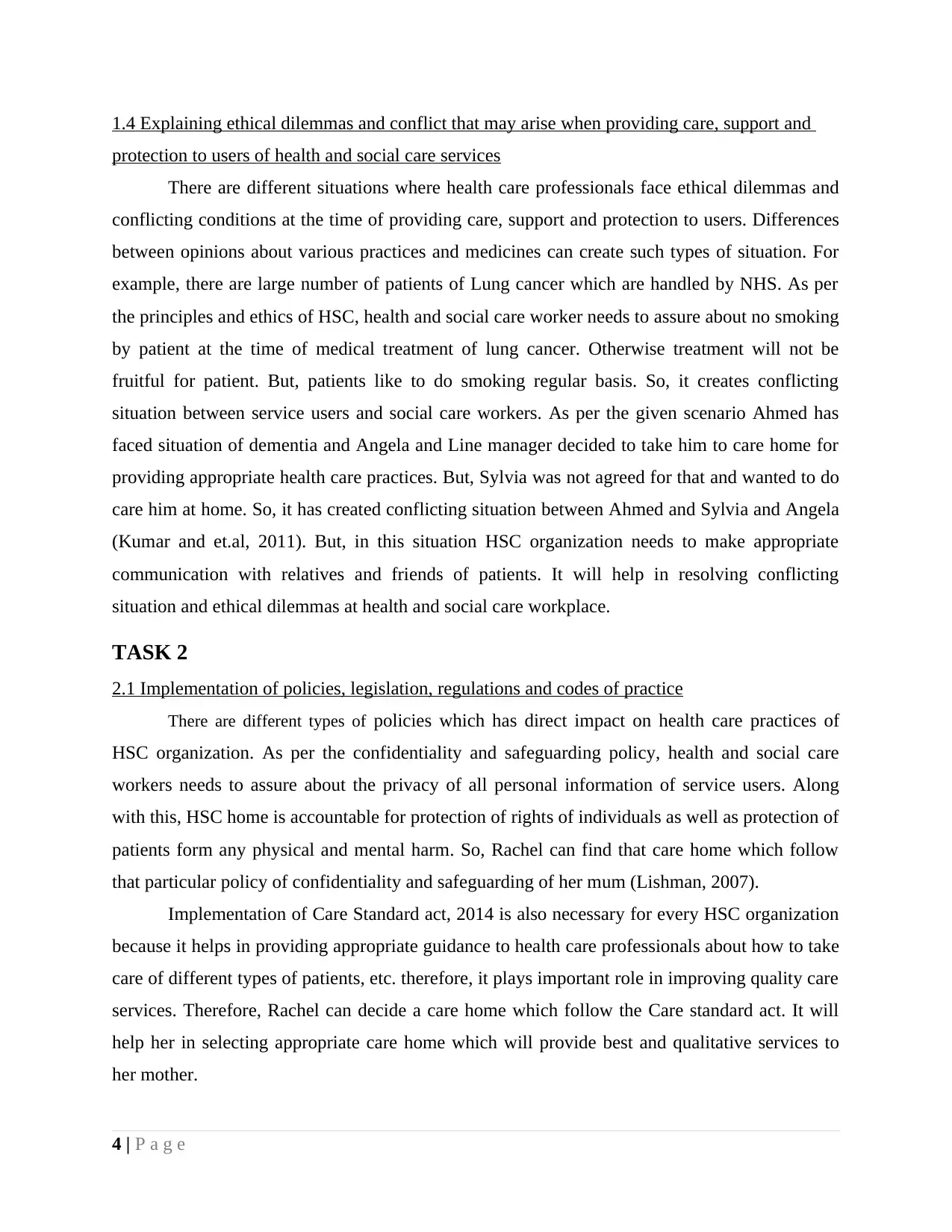
1.4 Explaining ethical dilemmas and conflict that may arise when providing care, support and
protection to users of health and social care services
There are different situations where health care professionals face ethical dilemmas and
conflicting conditions at the time of providing care, support and protection to users. Differences
between opinions about various practices and medicines can create such types of situation. For
example, there are large number of patients of Lung cancer which are handled by NHS. As per
the principles and ethics of HSC, health and social care worker needs to assure about no smoking
by patient at the time of medical treatment of lung cancer. Otherwise treatment will not be
fruitful for patient. But, patients like to do smoking regular basis. So, it creates conflicting
situation between service users and social care workers. As per the given scenario Ahmed has
faced situation of dementia and Angela and Line manager decided to take him to care home for
providing appropriate health care practices. But, Sylvia was not agreed for that and wanted to do
care him at home. So, it has created conflicting situation between Ahmed and Sylvia and Angela
(Kumar and et.al, 2011). But, in this situation HSC organization needs to make appropriate
communication with relatives and friends of patients. It will help in resolving conflicting
situation and ethical dilemmas at health and social care workplace.
TASK 2
2.1 Implementation of policies, legislation, regulations and codes of practice
There are different types of policies which has direct impact on health care practices of
HSC organization. As per the confidentiality and safeguarding policy, health and social care
workers needs to assure about the privacy of all personal information of service users. Along
with this, HSC home is accountable for protection of rights of individuals as well as protection of
patients form any physical and mental harm. So, Rachel can find that care home which follow
that particular policy of confidentiality and safeguarding of her mum (Lishman, 2007).
Implementation of Care Standard act, 2014 is also necessary for every HSC organization
because it helps in providing appropriate guidance to health care professionals about how to take
care of different types of patients, etc. therefore, it plays important role in improving quality care
services. Therefore, Rachel can decide a care home which follow the Care standard act. It will
help her in selecting appropriate care home which will provide best and qualitative services to
her mother.
4 | P a g e
protection to users of health and social care services
There are different situations where health care professionals face ethical dilemmas and
conflicting conditions at the time of providing care, support and protection to users. Differences
between opinions about various practices and medicines can create such types of situation. For
example, there are large number of patients of Lung cancer which are handled by NHS. As per
the principles and ethics of HSC, health and social care worker needs to assure about no smoking
by patient at the time of medical treatment of lung cancer. Otherwise treatment will not be
fruitful for patient. But, patients like to do smoking regular basis. So, it creates conflicting
situation between service users and social care workers. As per the given scenario Ahmed has
faced situation of dementia and Angela and Line manager decided to take him to care home for
providing appropriate health care practices. But, Sylvia was not agreed for that and wanted to do
care him at home. So, it has created conflicting situation between Ahmed and Sylvia and Angela
(Kumar and et.al, 2011). But, in this situation HSC organization needs to make appropriate
communication with relatives and friends of patients. It will help in resolving conflicting
situation and ethical dilemmas at health and social care workplace.
TASK 2
2.1 Implementation of policies, legislation, regulations and codes of practice
There are different types of policies which has direct impact on health care practices of
HSC organization. As per the confidentiality and safeguarding policy, health and social care
workers needs to assure about the privacy of all personal information of service users. Along
with this, HSC home is accountable for protection of rights of individuals as well as protection of
patients form any physical and mental harm. So, Rachel can find that care home which follow
that particular policy of confidentiality and safeguarding of her mum (Lishman, 2007).
Implementation of Care Standard act, 2014 is also necessary for every HSC organization
because it helps in providing appropriate guidance to health care professionals about how to take
care of different types of patients, etc. therefore, it plays important role in improving quality care
services. Therefore, Rachel can decide a care home which follow the Care standard act. It will
help her in selecting appropriate care home which will provide best and qualitative services to
her mother.
4 | P a g e
⊘ This is a preview!⊘
Do you want full access?
Subscribe today to unlock all pages.

Trusted by 1+ million students worldwide
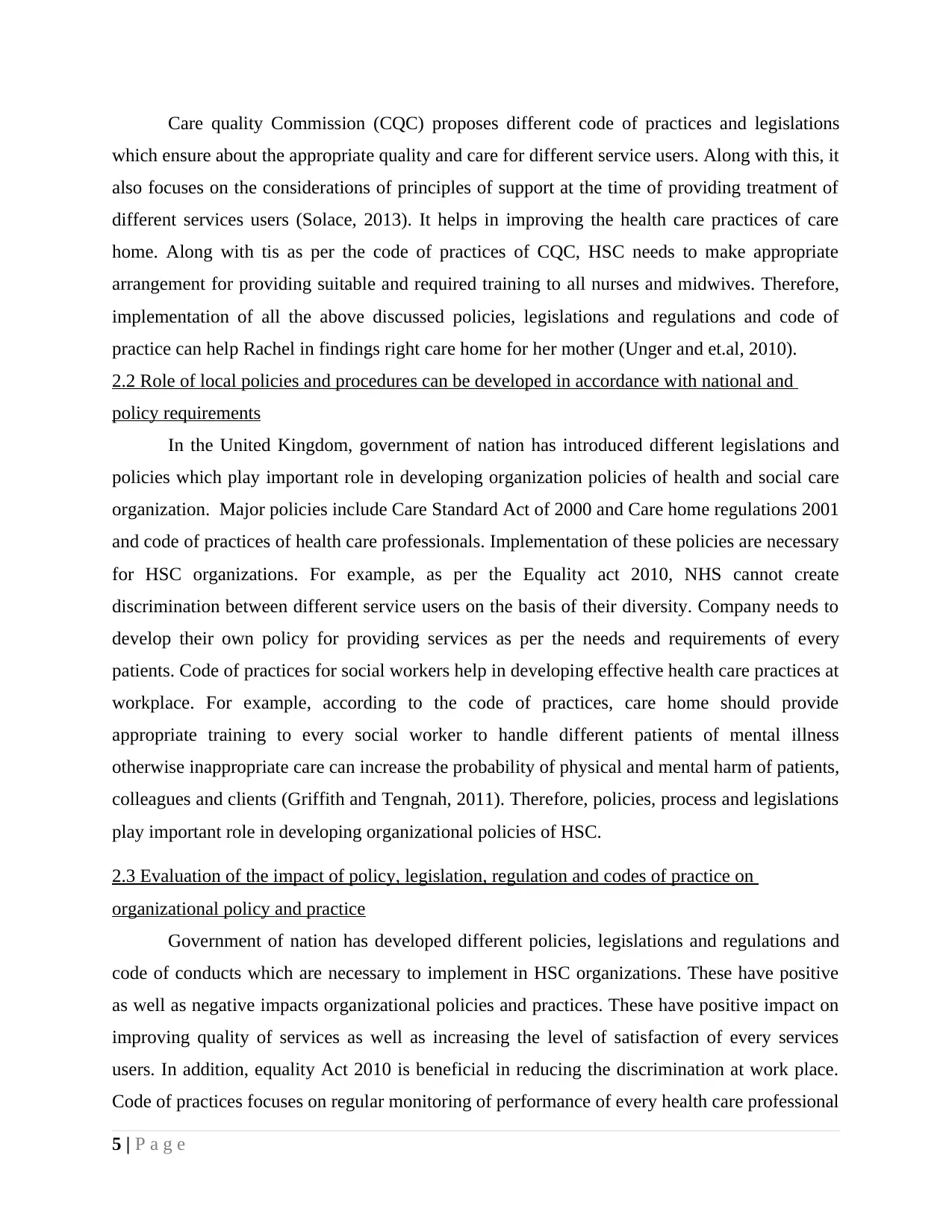
Care quality Commission (CQC) proposes different code of practices and legislations
which ensure about the appropriate quality and care for different service users. Along with this, it
also focuses on the considerations of principles of support at the time of providing treatment of
different services users (Solace, 2013). It helps in improving the health care practices of care
home. Along with tis as per the code of practices of CQC, HSC needs to make appropriate
arrangement for providing suitable and required training to all nurses and midwives. Therefore,
implementation of all the above discussed policies, legislations and regulations and code of
practice can help Rachel in findings right care home for her mother (Unger and et.al, 2010).
2.2 Role of local policies and procedures can be developed in accordance with national and
policy requirements
In the United Kingdom, government of nation has introduced different legislations and
policies which play important role in developing organization policies of health and social care
organization. Major policies include Care Standard Act of 2000 and Care home regulations 2001
and code of practices of health care professionals. Implementation of these policies are necessary
for HSC organizations. For example, as per the Equality act 2010, NHS cannot create
discrimination between different service users on the basis of their diversity. Company needs to
develop their own policy for providing services as per the needs and requirements of every
patients. Code of practices for social workers help in developing effective health care practices at
workplace. For example, according to the code of practices, care home should provide
appropriate training to every social worker to handle different patients of mental illness
otherwise inappropriate care can increase the probability of physical and mental harm of patients,
colleagues and clients (Griffith and Tengnah, 2011). Therefore, policies, process and legislations
play important role in developing organizational policies of HSC.
2.3 Evaluation of the impact of policy, legislation, regulation and codes of practice on
organizational policy and practice
Government of nation has developed different policies, legislations and regulations and
code of conducts which are necessary to implement in HSC organizations. These have positive
as well as negative impacts organizational policies and practices. These have positive impact on
improving quality of services as well as increasing the level of satisfaction of every services
users. In addition, equality Act 2010 is beneficial in reducing the discrimination at work place.
Code of practices focuses on regular monitoring of performance of every health care professional
5 | P a g e
which ensure about the appropriate quality and care for different service users. Along with this, it
also focuses on the considerations of principles of support at the time of providing treatment of
different services users (Solace, 2013). It helps in improving the health care practices of care
home. Along with tis as per the code of practices of CQC, HSC needs to make appropriate
arrangement for providing suitable and required training to all nurses and midwives. Therefore,
implementation of all the above discussed policies, legislations and regulations and code of
practice can help Rachel in findings right care home for her mother (Unger and et.al, 2010).
2.2 Role of local policies and procedures can be developed in accordance with national and
policy requirements
In the United Kingdom, government of nation has introduced different legislations and
policies which play important role in developing organization policies of health and social care
organization. Major policies include Care Standard Act of 2000 and Care home regulations 2001
and code of practices of health care professionals. Implementation of these policies are necessary
for HSC organizations. For example, as per the Equality act 2010, NHS cannot create
discrimination between different service users on the basis of their diversity. Company needs to
develop their own policy for providing services as per the needs and requirements of every
patients. Code of practices for social workers help in developing effective health care practices at
workplace. For example, according to the code of practices, care home should provide
appropriate training to every social worker to handle different patients of mental illness
otherwise inappropriate care can increase the probability of physical and mental harm of patients,
colleagues and clients (Griffith and Tengnah, 2011). Therefore, policies, process and legislations
play important role in developing organizational policies of HSC.
2.3 Evaluation of the impact of policy, legislation, regulation and codes of practice on
organizational policy and practice
Government of nation has developed different policies, legislations and regulations and
code of conducts which are necessary to implement in HSC organizations. These have positive
as well as negative impacts organizational policies and practices. These have positive impact on
improving quality of services as well as increasing the level of satisfaction of every services
users. In addition, equality Act 2010 is beneficial in reducing the discrimination at work place.
Code of practices focuses on regular monitoring of performance of every health care professional
5 | P a g e
Paraphrase This Document
Need a fresh take? Get an instant paraphrase of this document with our AI Paraphraser
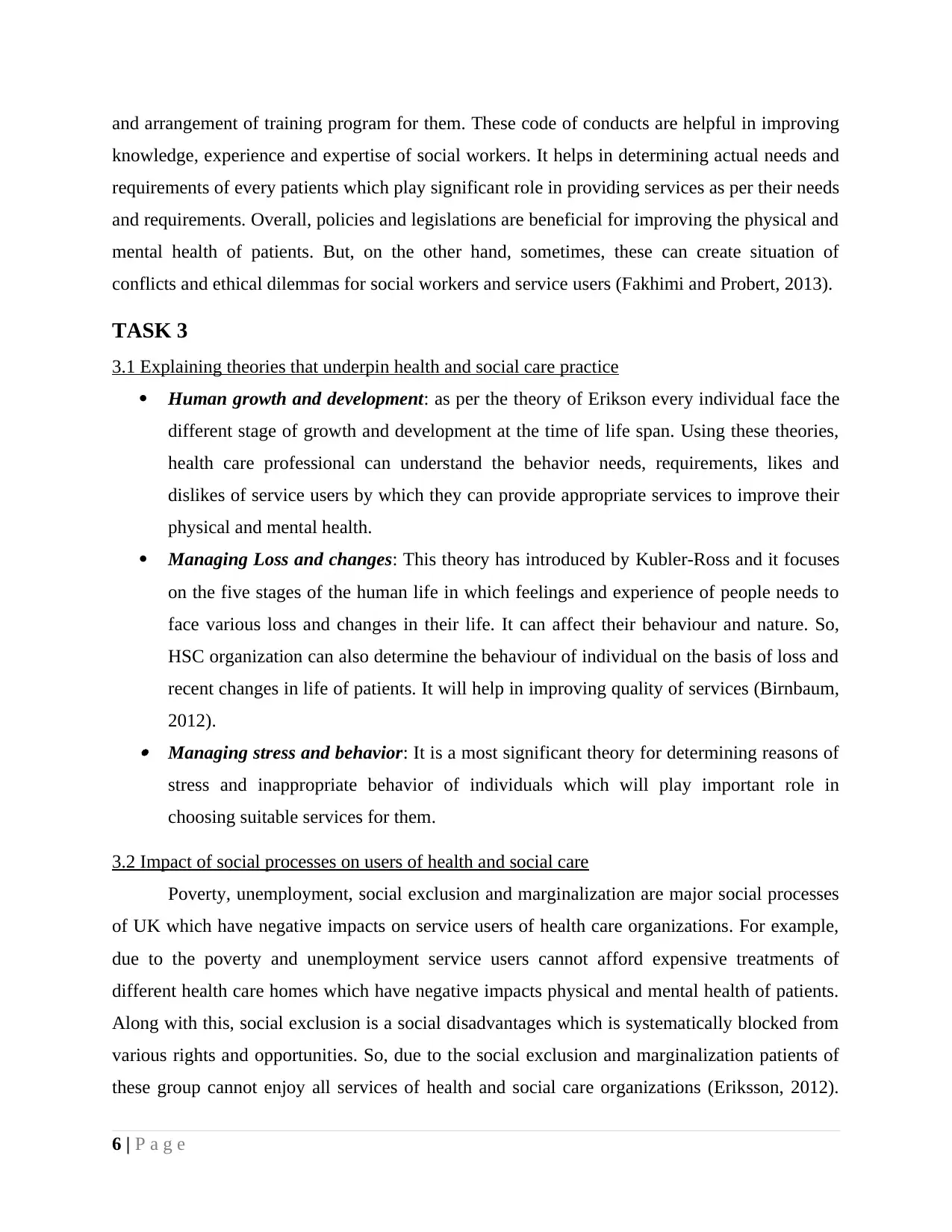
and arrangement of training program for them. These code of conducts are helpful in improving
knowledge, experience and expertise of social workers. It helps in determining actual needs and
requirements of every patients which play significant role in providing services as per their needs
and requirements. Overall, policies and legislations are beneficial for improving the physical and
mental health of patients. But, on the other hand, sometimes, these can create situation of
conflicts and ethical dilemmas for social workers and service users (Fakhimi and Probert, 2013).
TASK 3
3.1 Explaining theories that underpin health and social care practice
Human growth and development: as per the theory of Erikson every individual face the
different stage of growth and development at the time of life span. Using these theories,
health care professional can understand the behavior needs, requirements, likes and
dislikes of service users by which they can provide appropriate services to improve their
physical and mental health.
Managing Loss and changes: This theory has introduced by Kubler-Ross and it focuses
on the five stages of the human life in which feelings and experience of people needs to
face various loss and changes in their life. It can affect their behaviour and nature. So,
HSC organization can also determine the behaviour of individual on the basis of loss and
recent changes in life of patients. It will help in improving quality of services (Birnbaum,
2012). Managing stress and behavior: It is a most significant theory for determining reasons of
stress and inappropriate behavior of individuals which will play important role in
choosing suitable services for them.
3.2 Impact of social processes on users of health and social care
Poverty, unemployment, social exclusion and marginalization are major social processes
of UK which have negative impacts on service users of health care organizations. For example,
due to the poverty and unemployment service users cannot afford expensive treatments of
different health care homes which have negative impacts physical and mental health of patients.
Along with this, social exclusion is a social disadvantages which is systematically blocked from
various rights and opportunities. So, due to the social exclusion and marginalization patients of
these group cannot enjoy all services of health and social care organizations (Eriksson, 2012).
6 | P a g e
knowledge, experience and expertise of social workers. It helps in determining actual needs and
requirements of every patients which play significant role in providing services as per their needs
and requirements. Overall, policies and legislations are beneficial for improving the physical and
mental health of patients. But, on the other hand, sometimes, these can create situation of
conflicts and ethical dilemmas for social workers and service users (Fakhimi and Probert, 2013).
TASK 3
3.1 Explaining theories that underpin health and social care practice
Human growth and development: as per the theory of Erikson every individual face the
different stage of growth and development at the time of life span. Using these theories,
health care professional can understand the behavior needs, requirements, likes and
dislikes of service users by which they can provide appropriate services to improve their
physical and mental health.
Managing Loss and changes: This theory has introduced by Kubler-Ross and it focuses
on the five stages of the human life in which feelings and experience of people needs to
face various loss and changes in their life. It can affect their behaviour and nature. So,
HSC organization can also determine the behaviour of individual on the basis of loss and
recent changes in life of patients. It will help in improving quality of services (Birnbaum,
2012). Managing stress and behavior: It is a most significant theory for determining reasons of
stress and inappropriate behavior of individuals which will play important role in
choosing suitable services for them.
3.2 Impact of social processes on users of health and social care
Poverty, unemployment, social exclusion and marginalization are major social processes
of UK which have negative impacts on service users of health care organizations. For example,
due to the poverty and unemployment service users cannot afford expensive treatments of
different health care homes which have negative impacts physical and mental health of patients.
Along with this, social exclusion is a social disadvantages which is systematically blocked from
various rights and opportunities. So, due to the social exclusion and marginalization patients of
these group cannot enjoy all services of health and social care organizations (Eriksson, 2012).
6 | P a g e
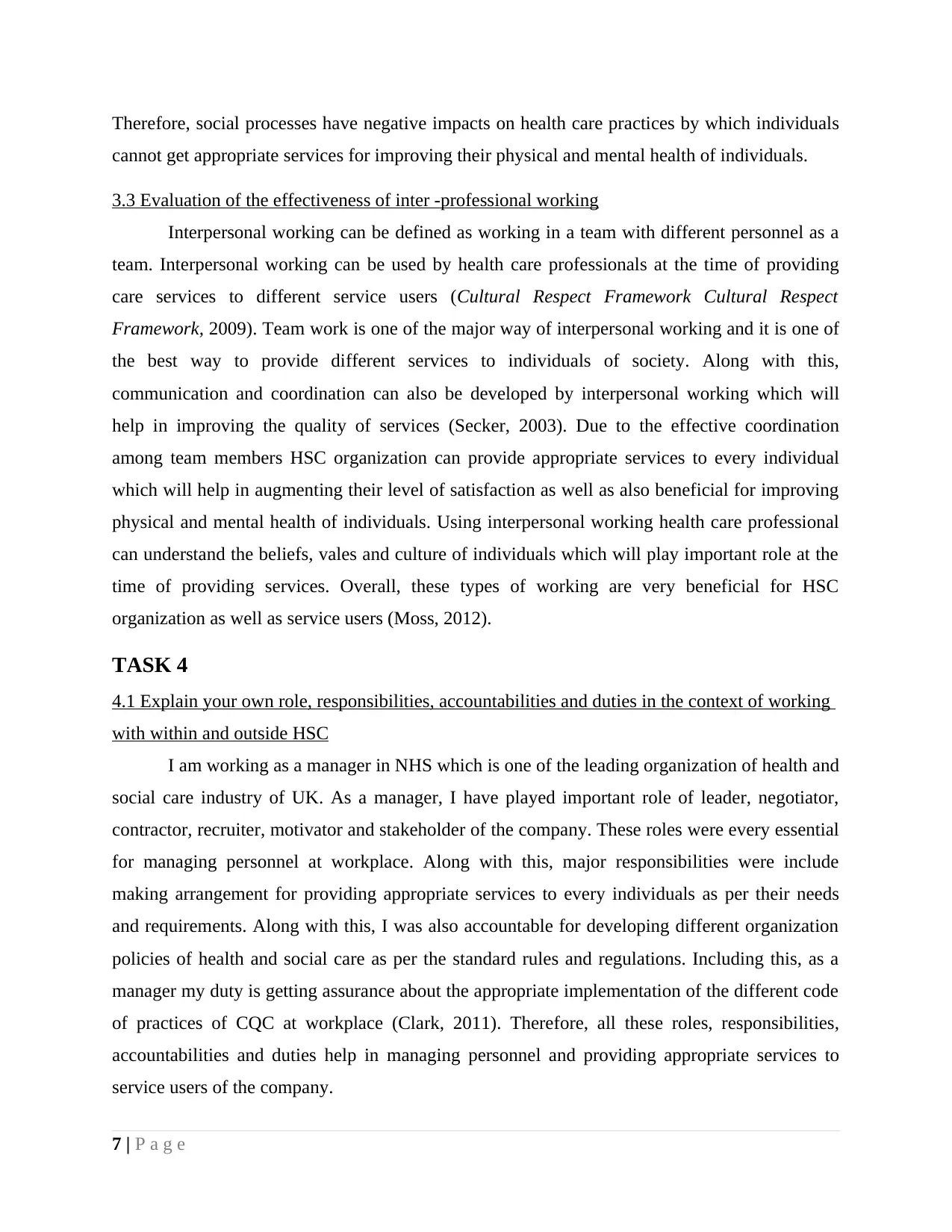
Therefore, social processes have negative impacts on health care practices by which individuals
cannot get appropriate services for improving their physical and mental health of individuals.
3.3 Evaluation of the effectiveness of inter -professional working
Interpersonal working can be defined as working in a team with different personnel as a
team. Interpersonal working can be used by health care professionals at the time of providing
care services to different service users (Cultural Respect Framework Cultural Respect
Framework, 2009). Team work is one of the major way of interpersonal working and it is one of
the best way to provide different services to individuals of society. Along with this,
communication and coordination can also be developed by interpersonal working which will
help in improving the quality of services (Secker, 2003). Due to the effective coordination
among team members HSC organization can provide appropriate services to every individual
which will help in augmenting their level of satisfaction as well as also beneficial for improving
physical and mental health of individuals. Using interpersonal working health care professional
can understand the beliefs, vales and culture of individuals which will play important role at the
time of providing services. Overall, these types of working are very beneficial for HSC
organization as well as service users (Moss, 2012).
TASK 4
4.1 Explain your own role, responsibilities, accountabilities and duties in the context of working
with within and outside HSC
I am working as a manager in NHS which is one of the leading organization of health and
social care industry of UK. As a manager, I have played important role of leader, negotiator,
contractor, recruiter, motivator and stakeholder of the company. These roles were every essential
for managing personnel at workplace. Along with this, major responsibilities were include
making arrangement for providing appropriate services to every individuals as per their needs
and requirements. Along with this, I was also accountable for developing different organization
policies of health and social care as per the standard rules and regulations. Including this, as a
manager my duty is getting assurance about the appropriate implementation of the different code
of practices of CQC at workplace (Clark, 2011). Therefore, all these roles, responsibilities,
accountabilities and duties help in managing personnel and providing appropriate services to
service users of the company.
7 | P a g e
cannot get appropriate services for improving their physical and mental health of individuals.
3.3 Evaluation of the effectiveness of inter -professional working
Interpersonal working can be defined as working in a team with different personnel as a
team. Interpersonal working can be used by health care professionals at the time of providing
care services to different service users (Cultural Respect Framework Cultural Respect
Framework, 2009). Team work is one of the major way of interpersonal working and it is one of
the best way to provide different services to individuals of society. Along with this,
communication and coordination can also be developed by interpersonal working which will
help in improving the quality of services (Secker, 2003). Due to the effective coordination
among team members HSC organization can provide appropriate services to every individual
which will help in augmenting their level of satisfaction as well as also beneficial for improving
physical and mental health of individuals. Using interpersonal working health care professional
can understand the beliefs, vales and culture of individuals which will play important role at the
time of providing services. Overall, these types of working are very beneficial for HSC
organization as well as service users (Moss, 2012).
TASK 4
4.1 Explain your own role, responsibilities, accountabilities and duties in the context of working
with within and outside HSC
I am working as a manager in NHS which is one of the leading organization of health and
social care industry of UK. As a manager, I have played important role of leader, negotiator,
contractor, recruiter, motivator and stakeholder of the company. These roles were every essential
for managing personnel at workplace. Along with this, major responsibilities were include
making arrangement for providing appropriate services to every individuals as per their needs
and requirements. Along with this, I was also accountable for developing different organization
policies of health and social care as per the standard rules and regulations. Including this, as a
manager my duty is getting assurance about the appropriate implementation of the different code
of practices of CQC at workplace (Clark, 2011). Therefore, all these roles, responsibilities,
accountabilities and duties help in managing personnel and providing appropriate services to
service users of the company.
7 | P a g e
⊘ This is a preview!⊘
Do you want full access?
Subscribe today to unlock all pages.

Trusted by 1+ million students worldwide
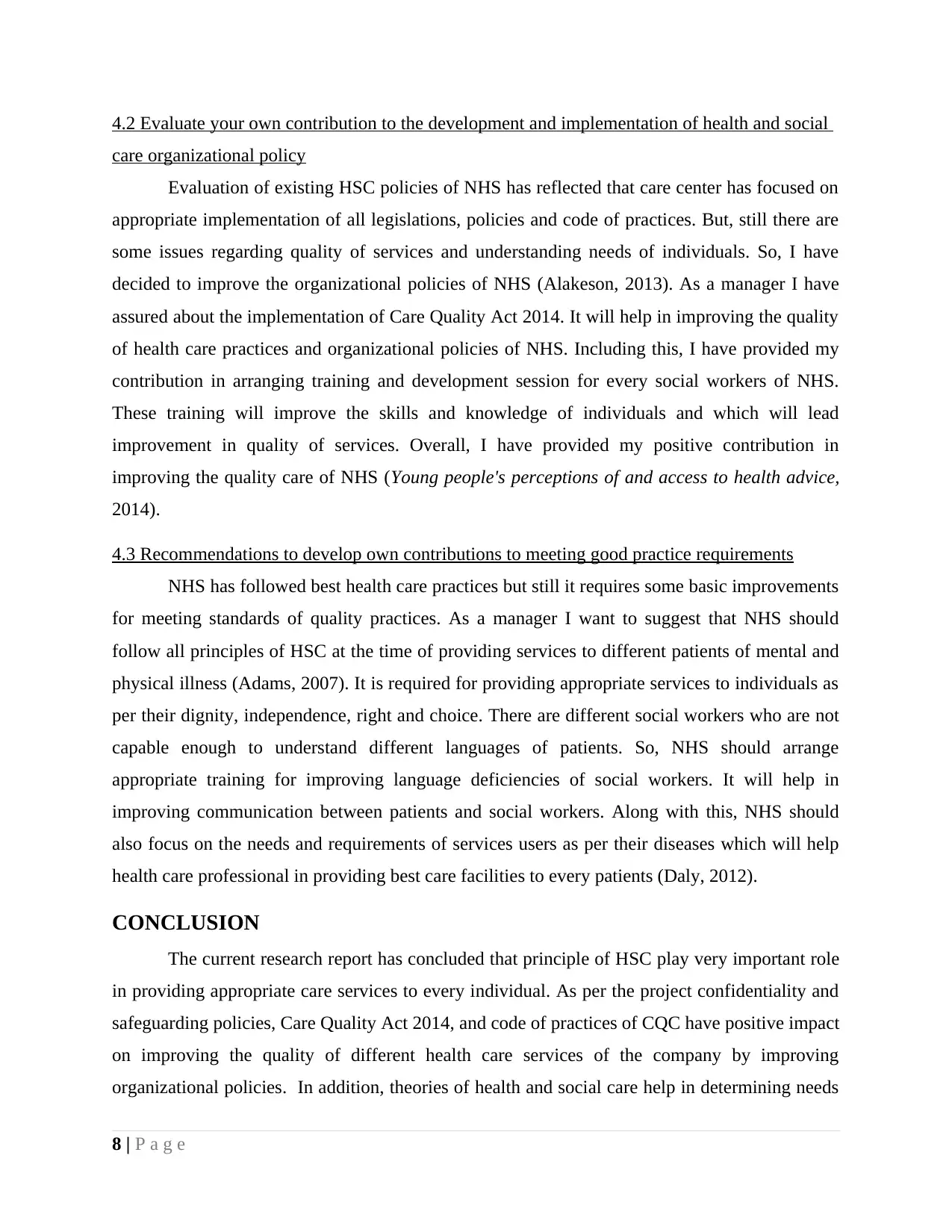
4.2 Evaluate your own contribution to the development and implementation of health and social
care organizational policy
Evaluation of existing HSC policies of NHS has reflected that care center has focused on
appropriate implementation of all legislations, policies and code of practices. But, still there are
some issues regarding quality of services and understanding needs of individuals. So, I have
decided to improve the organizational policies of NHS (Alakeson, 2013). As a manager I have
assured about the implementation of Care Quality Act 2014. It will help in improving the quality
of health care practices and organizational policies of NHS. Including this, I have provided my
contribution in arranging training and development session for every social workers of NHS.
These training will improve the skills and knowledge of individuals and which will lead
improvement in quality of services. Overall, I have provided my positive contribution in
improving the quality care of NHS (Young people's perceptions of and access to health advice,
2014).
4.3 Recommendations to develop own contributions to meeting good practice requirements
NHS has followed best health care practices but still it requires some basic improvements
for meeting standards of quality practices. As a manager I want to suggest that NHS should
follow all principles of HSC at the time of providing services to different patients of mental and
physical illness (Adams, 2007). It is required for providing appropriate services to individuals as
per their dignity, independence, right and choice. There are different social workers who are not
capable enough to understand different languages of patients. So, NHS should arrange
appropriate training for improving language deficiencies of social workers. It will help in
improving communication between patients and social workers. Along with this, NHS should
also focus on the needs and requirements of services users as per their diseases which will help
health care professional in providing best care facilities to every patients (Daly, 2012).
CONCLUSION
The current research report has concluded that principle of HSC play very important role
in providing appropriate care services to every individual. As per the project confidentiality and
safeguarding policies, Care Quality Act 2014, and code of practices of CQC have positive impact
on improving the quality of different health care services of the company by improving
organizational policies. In addition, theories of health and social care help in determining needs
8 | P a g e
care organizational policy
Evaluation of existing HSC policies of NHS has reflected that care center has focused on
appropriate implementation of all legislations, policies and code of practices. But, still there are
some issues regarding quality of services and understanding needs of individuals. So, I have
decided to improve the organizational policies of NHS (Alakeson, 2013). As a manager I have
assured about the implementation of Care Quality Act 2014. It will help in improving the quality
of health care practices and organizational policies of NHS. Including this, I have provided my
contribution in arranging training and development session for every social workers of NHS.
These training will improve the skills and knowledge of individuals and which will lead
improvement in quality of services. Overall, I have provided my positive contribution in
improving the quality care of NHS (Young people's perceptions of and access to health advice,
2014).
4.3 Recommendations to develop own contributions to meeting good practice requirements
NHS has followed best health care practices but still it requires some basic improvements
for meeting standards of quality practices. As a manager I want to suggest that NHS should
follow all principles of HSC at the time of providing services to different patients of mental and
physical illness (Adams, 2007). It is required for providing appropriate services to individuals as
per their dignity, independence, right and choice. There are different social workers who are not
capable enough to understand different languages of patients. So, NHS should arrange
appropriate training for improving language deficiencies of social workers. It will help in
improving communication between patients and social workers. Along with this, NHS should
also focus on the needs and requirements of services users as per their diseases which will help
health care professional in providing best care facilities to every patients (Daly, 2012).
CONCLUSION
The current research report has concluded that principle of HSC play very important role
in providing appropriate care services to every individual. As per the project confidentiality and
safeguarding policies, Care Quality Act 2014, and code of practices of CQC have positive impact
on improving the quality of different health care services of the company by improving
organizational policies. In addition, theories of health and social care help in determining needs
8 | P a g e
Paraphrase This Document
Need a fresh take? Get an instant paraphrase of this document with our AI Paraphraser
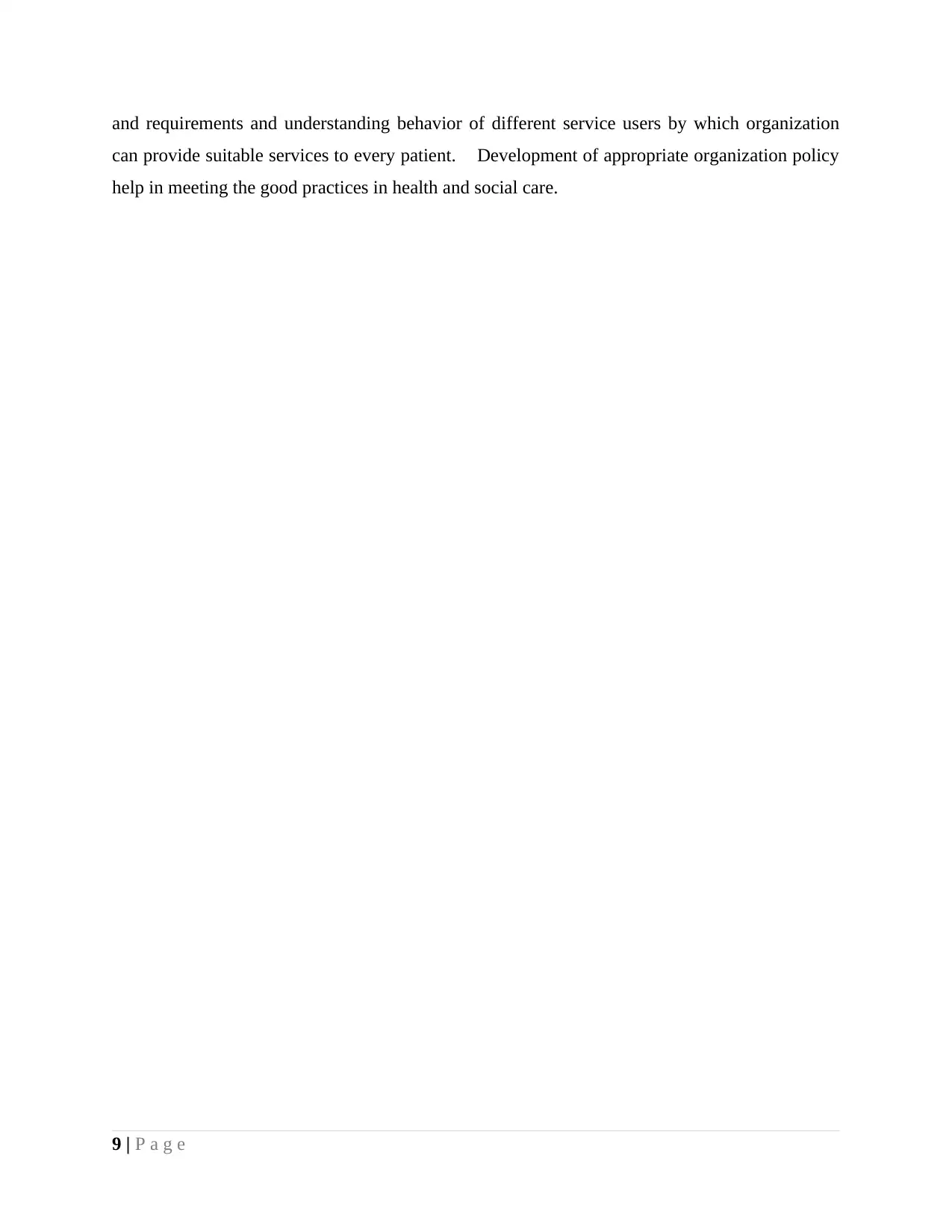
and requirements and understanding behavior of different service users by which organization
can provide suitable services to every patient. Development of appropriate organization policy
help in meeting the good practices in health and social care.
9 | P a g e
can provide suitable services to every patient. Development of appropriate organization policy
help in meeting the good practices in health and social care.
9 | P a g e
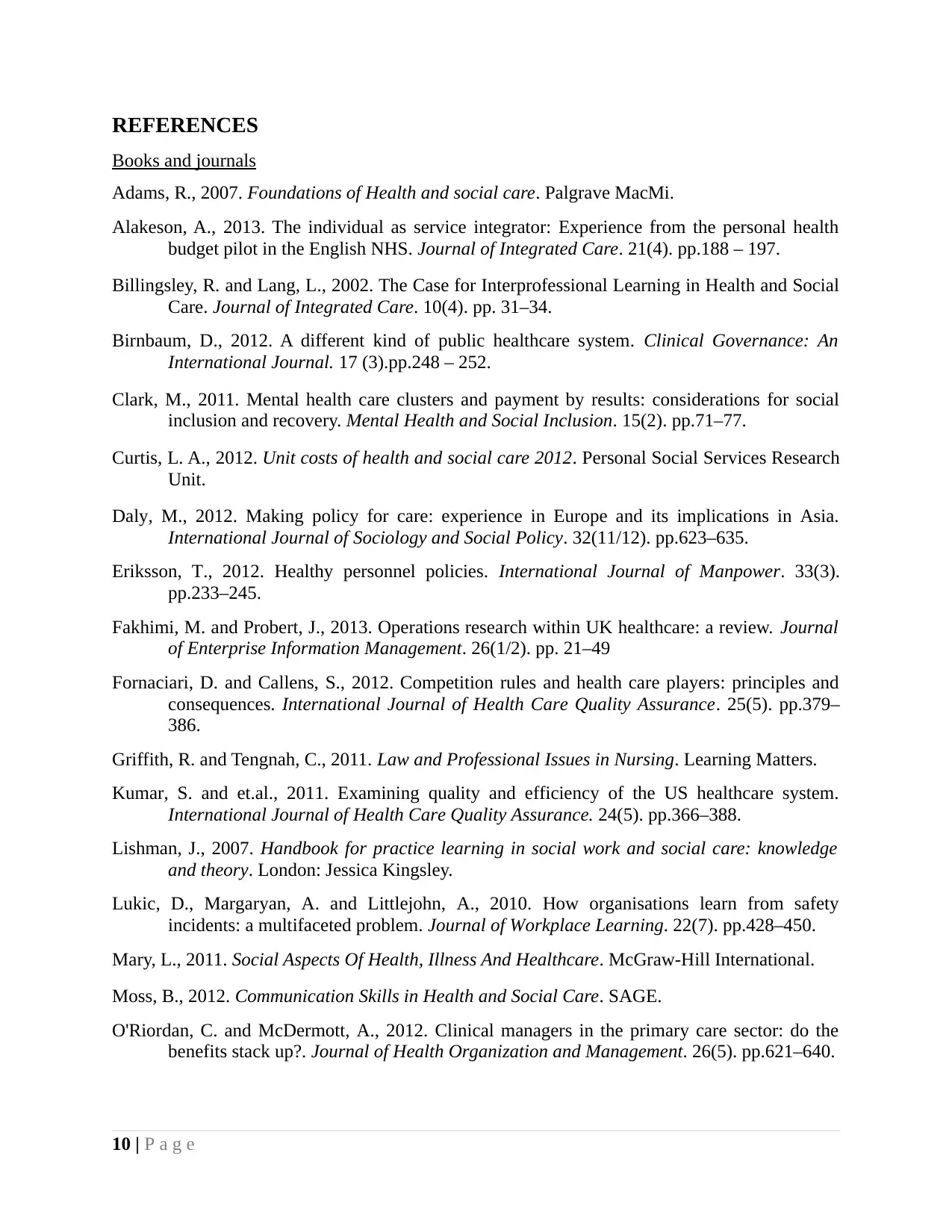
REFERENCES
Books and journals
Adams, R., 2007. Foundations of Health and social care. Palgrave MacMi.
Alakeson, A., 2013. The individual as service integrator: Experience from the personal health
budget pilot in the English NHS. Journal of Integrated Care. 21(4). pp.188 – 197.
Billingsley, R. and Lang, L., 2002. The Case for Interprofessional Learning in Health and Social
Care. Journal of Integrated Care. 10(4). pp. 31–34.
Birnbaum, D., 2012. A different kind of public healthcare system. Clinical Governance: An
International Journal. 17 (3).pp.248 – 252.
Clark, M., 2011. Mental health care clusters and payment by results: considerations for social
inclusion and recovery. Mental Health and Social Inclusion. 15(2). pp.71–77.
Curtis, L. A., 2012. Unit costs of health and social care 2012. Personal Social Services Research
Unit.
Daly, M., 2012. Making policy for care: experience in Europe and its implications in Asia.
International Journal of Sociology and Social Policy. 32(11/12). pp.623–635.
Eriksson, T., 2012. Healthy personnel policies. International Journal of Manpower. 33(3).
pp.233–245.
Fakhimi, M. and Probert, J., 2013. Operations research within UK healthcare: a review. Journal
of Enterprise Information Management. 26(1/2). pp. 21–49
Fornaciari, D. and Callens, S., 2012. Competition rules and health care players: principles and
consequences. International Journal of Health Care Quality Assurance. 25(5). pp.379–
386.
Griffith, R. and Tengnah, C., 2011. Law and Professional Issues in Nursing. Learning Matters.
Kumar, S. and et.al., 2011. Examining quality and efficiency of the US healthcare system.
International Journal of Health Care Quality Assurance. 24(5). pp.366–388.
Lishman, J., 2007. Handbook for practice learning in social work and social care: knowledge
and theory. London: Jessica Kingsley.
Lukic, D., Margaryan, A. and Littlejohn, A., 2010. How organisations learn from safety
incidents: a multifaceted problem. Journal of Workplace Learning. 22(7). pp.428–450.
Mary, L., 2011. Social Aspects Of Health, Illness And Healthcare. McGraw-Hill International.
Moss, B., 2012. Communication Skills in Health and Social Care. SAGE.
O'Riordan, C. and McDermott, A., 2012. Clinical managers in the primary care sector: do the
benefits stack up?. Journal of Health Organization and Management. 26(5). pp.621–640.
10 | P a g e
Books and journals
Adams, R., 2007. Foundations of Health and social care. Palgrave MacMi.
Alakeson, A., 2013. The individual as service integrator: Experience from the personal health
budget pilot in the English NHS. Journal of Integrated Care. 21(4). pp.188 – 197.
Billingsley, R. and Lang, L., 2002. The Case for Interprofessional Learning in Health and Social
Care. Journal of Integrated Care. 10(4). pp. 31–34.
Birnbaum, D., 2012. A different kind of public healthcare system. Clinical Governance: An
International Journal. 17 (3).pp.248 – 252.
Clark, M., 2011. Mental health care clusters and payment by results: considerations for social
inclusion and recovery. Mental Health and Social Inclusion. 15(2). pp.71–77.
Curtis, L. A., 2012. Unit costs of health and social care 2012. Personal Social Services Research
Unit.
Daly, M., 2012. Making policy for care: experience in Europe and its implications in Asia.
International Journal of Sociology and Social Policy. 32(11/12). pp.623–635.
Eriksson, T., 2012. Healthy personnel policies. International Journal of Manpower. 33(3).
pp.233–245.
Fakhimi, M. and Probert, J., 2013. Operations research within UK healthcare: a review. Journal
of Enterprise Information Management. 26(1/2). pp. 21–49
Fornaciari, D. and Callens, S., 2012. Competition rules and health care players: principles and
consequences. International Journal of Health Care Quality Assurance. 25(5). pp.379–
386.
Griffith, R. and Tengnah, C., 2011. Law and Professional Issues in Nursing. Learning Matters.
Kumar, S. and et.al., 2011. Examining quality and efficiency of the US healthcare system.
International Journal of Health Care Quality Assurance. 24(5). pp.366–388.
Lishman, J., 2007. Handbook for practice learning in social work and social care: knowledge
and theory. London: Jessica Kingsley.
Lukic, D., Margaryan, A. and Littlejohn, A., 2010. How organisations learn from safety
incidents: a multifaceted problem. Journal of Workplace Learning. 22(7). pp.428–450.
Mary, L., 2011. Social Aspects Of Health, Illness And Healthcare. McGraw-Hill International.
Moss, B., 2012. Communication Skills in Health and Social Care. SAGE.
O'Riordan, C. and McDermott, A., 2012. Clinical managers in the primary care sector: do the
benefits stack up?. Journal of Health Organization and Management. 26(5). pp.621–640.
10 | P a g e
⊘ This is a preview!⊘
Do you want full access?
Subscribe today to unlock all pages.

Trusted by 1+ million students worldwide
1 out of 14
Related Documents
Your All-in-One AI-Powered Toolkit for Academic Success.
+13062052269
info@desklib.com
Available 24*7 on WhatsApp / Email
![[object Object]](/_next/static/media/star-bottom.7253800d.svg)
Unlock your academic potential
Copyright © 2020–2026 A2Z Services. All Rights Reserved. Developed and managed by ZUCOL.





